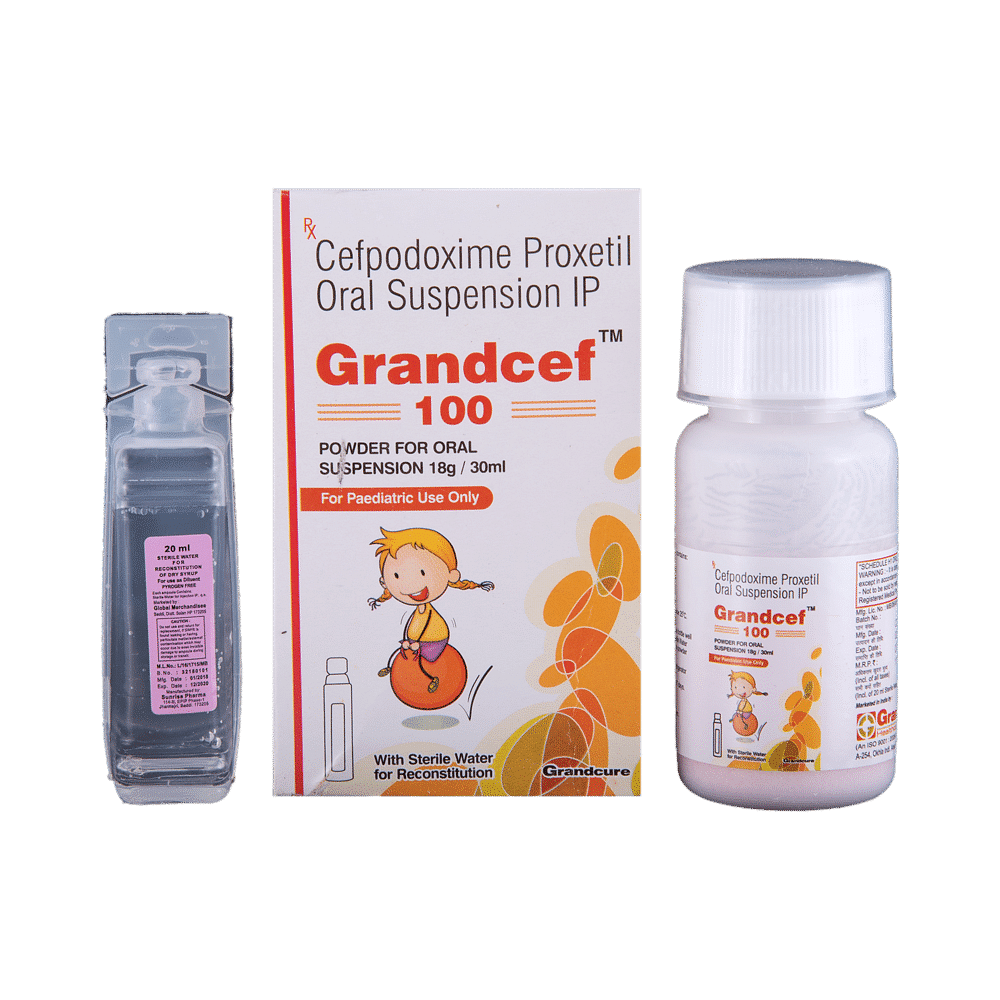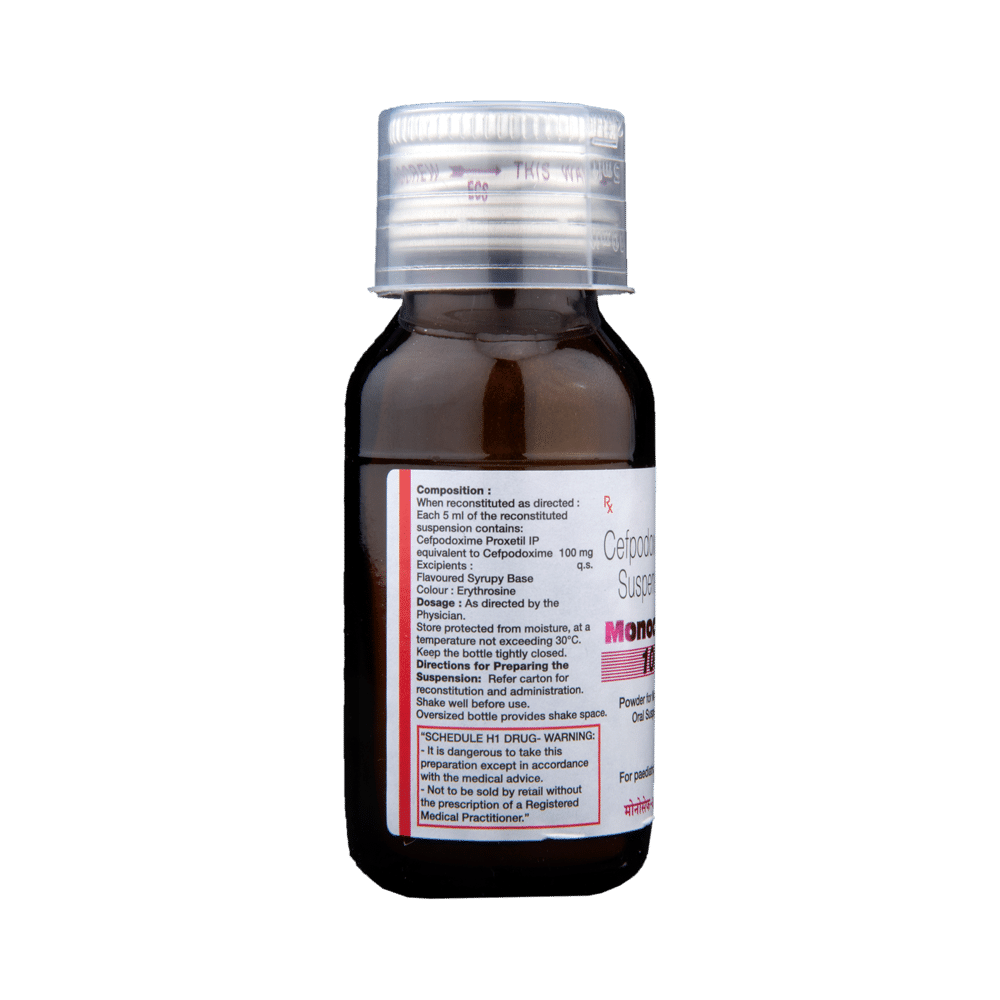
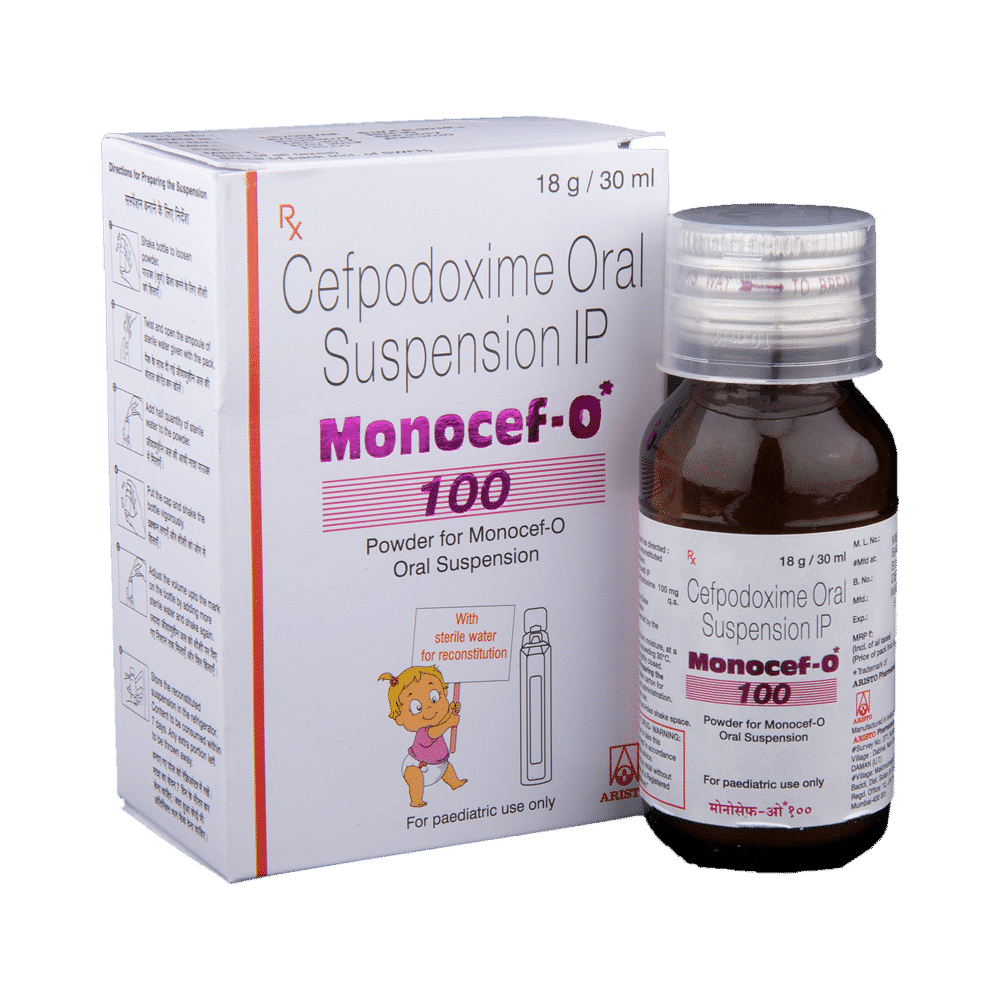

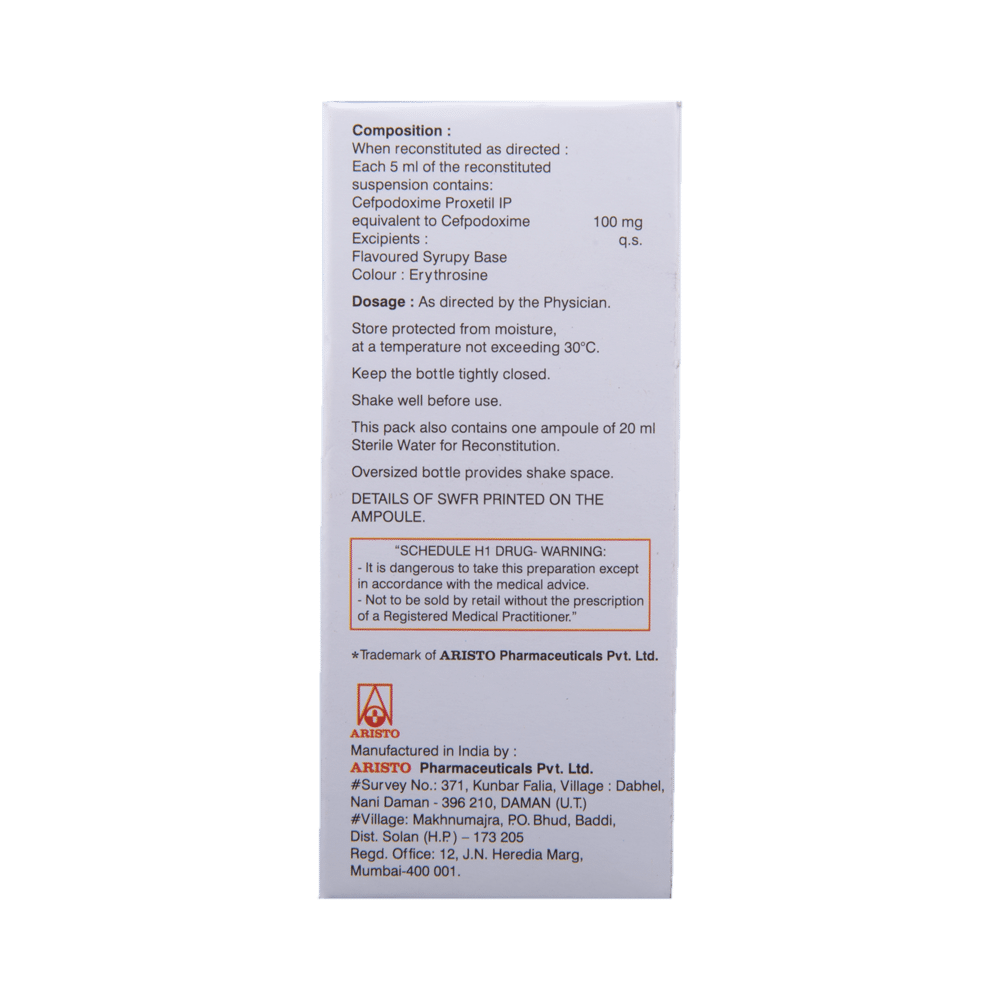
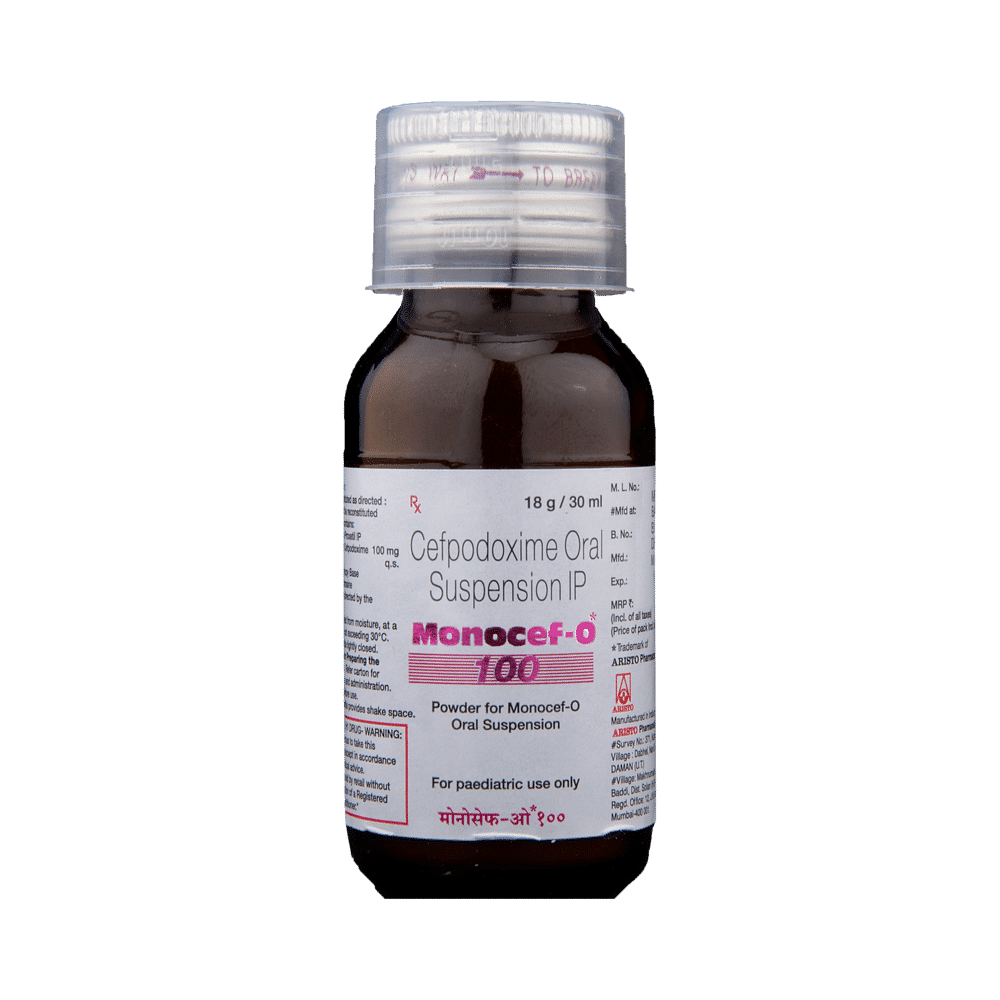
Monocef-O 100 Suspension
Manufacturer
Aristo Pharmaceuticals Pvt Ltd
Salt Composition
Cefpodoxime (100mg/5ml)
Key Information
Short Description
Monocef-O 100 Powder for Oral Suspension is an antibiotic medicine used to treat a wide range of bacterial infections in children, including ear, eye, nose, throat, lung, skin, gastrointestinal tract, and urinary tract infections, as well as typhoid fever.
Dosage Form
Powder for Oral Suspension
Introduction
Monocef-O 100 Powder for Oral Suspension is an antibiotic medicine commonly given to children for the treatment of a wide range of bacterial infections. It is effective in treating infections targeting the ears, eyes, nose, throat, lungs, skin, gastrointestinal tract, and urinary tract. It is also used to treat typhoid fever in children and adolescents.
Directions for Use
Give this medicine with food to avoid an upset stomach. Encourage your child to drink plenty of water in case diarrhea develops as a side effect.
How it works
Monocef-O 100 Powder for Oral Suspension is an antibiotic that works by preventing the formation of the bacterial protective covering (cell wall) which is essential for the survival of the bacteria.
Quick Tips
Your child must complete the entire course of antibiotics. Stopping too soon may cause the bacteria to multiply again or become resistant or cause another infection. Give this medicine with food to avoid an upset stomach. Encourage your child to drink plenty of water in case diarrhea develops as a side effect. Conditions like common cold and flu are caused by viruses. Never use this medicine for such conditions. Only give Monocef-O 100 Powder for Oral Suspension to your child for their current infection. Never save medicine for future illnesses.
Related Medicines
Frequently asked questions
What if I give too much of Monocef-O 100 Powder for Oral Suspension by mistake?
Overdosing on Monocef-O 100 Powder for Oral Suspension is unlikely to cause serious harm, but if you suspect an overdose, consult a healthcare professional immediately. Overdose may lead to undesirable side effects or worsen your child's condition.
Are there any possible serious side effects of Monocef-O 100 Powder for Oral Suspension?
Some severe adverse reactions associated with this medicine include persistent vomiting, kidney damage, allergic reactions, diarrhea, and severe gastrointestinal infections. Always seek guidance from your child's doctor if you experience these side effects.
Can other medicines be given at the same time as Monocef-O 100 Powder for Oral Suspension?
It's crucial to inform your healthcare provider about any other medications your child is taking before starting Monocef-O 100 Powder for Oral Suspension. Additionally, consult your doctor before administering any medication to your child.
Can I get my child vaccinated while on treatment with Monocef-O 100 Powder for Oral Suspension?
Generally, antibiotics do not significantly interfere with vaccines or cause adverse reactions in children after vaccination. However, it is advisable to hold off on vaccinations until your child's illness resolves. Once they feel better, the vaccine can be administered.
Which lab tests may my child undergo while taking Monocef-O 100 Powder for Oral Suspension on a long-term basis?
Your child's doctor might recommend periodic kidney function tests and liver function tests to monitor their condition closely.
The mucus coming out of my child’s nose is yellow-green. Is it a sign of a bacterial infection?
Yellow or green mucus in the nose does not always indicate the need for antibiotics. During a typical cold, mucus often thickens and changes color from clear to yellow or green. Symptoms usually resolve within 7-10 days.
My child is having a sore throat and ear infection. Can I give antibiotics?
No. Sore throats and ear infections, in most cases, are caused by viruses. Antibiotics are not effective against viral infections. If your child has a sore throat, runny nose, a barky cough, pain, and discharge from the ear, it's likely a virus. Consult your doctor for guidance.
Does a common cold caused by viruses always result in a secondary bacterial infection? When to start an antibiotic to prevent infection?
In most cases, bacterial infections do not follow viral infections. It is important to note that using antibiotics unnecessarily may lead to harmful side effects without actually benefiting your child's health. Consult with your doctor for appropriate treatment.
Can Monocef-O 100 Powder for Oral Suspension impact my child’s digestive system?
Some children might experience a sensitive stomach while taking antibiotics, which can also disrupt their gut bacteria. Using Monocef-O 100 Powder for Oral Suspension may further contribute to this by depleting good bacteria in the gut. If your child experiences diarrhea while on this medication, please do not stop the course of treatment without first seeking guidance from your doctor. In some cases, adjustments to the dosage might be necessary.
Can Monocef-O 100 Powder for Oral Suspension lead to bacterial resistance in my child?
Yes, if used inappropriately, including irregular treatment patterns, repeated use, or misuse of Monocef-O 100 Powder for Oral Suspension can result in antibiotic resistance. Resistant bacteria are no longer susceptible to the antibiotics and may lead to reinfection.




